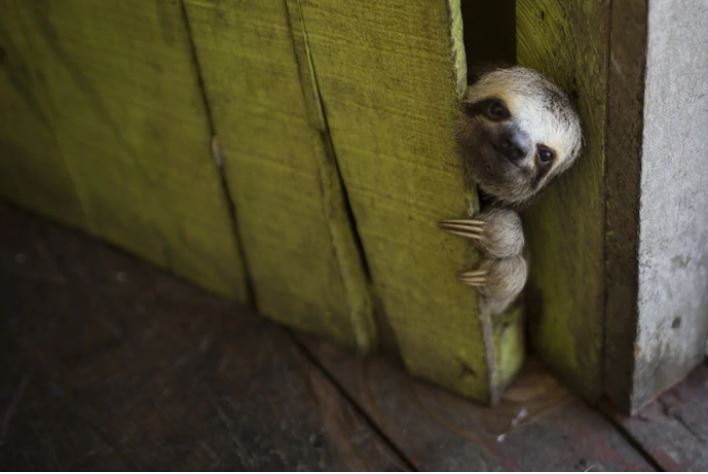But there’s one thing a baby sloth does that you will never see in a Pixar film — a bodily function so disturbing, both David Attenborough’s "Life of Mammals" and Animal Planet’s "Meet the Sloths" have taken great care to turn the cameras away once it begins.
We all do it. It’s a necessary part of life. I’m talking, of course, about pooping. And we went there.
“It’s always a special occasion when the sloth poops,” said Cathy Schlott, curator for the National Aviary in Pittsburgh. (She’s also the person holding Valentino in the video — yes, video — below. Start preparing yourself now.)
Sloths only urinate and defecate once a week, said Schlott. “So when the floodgates open, it’s a big production,” she said.
At this point in our interview, Schlott was speaking from past experience. She was holding Valentino in a soft, blue blanket and allowing him to eat at his leisure while I pelted her with questions about sloth anatomy and behavior. We had strayed into the realm of sloth skull shape when the unthinkable happened.
Valentino, bless his little heart, started defecating.
Because constipation is the norm for sloths, each bowel movement is a bit like giving birth. The animal’s dung emerges in one long piece which has the overall size, shape and color of a rotten banana. Witnessing it up close is as impressive as it is horrific.
And lucky for you, my wife was there to film it.
[WARNING: The video you are about to watch is graphic. You may not want to watch it at work. Please rest assured: No sloths were harmed in the filming process, which is kind of amazing given the size of that poo. But it also has some cute baby sloths not pooping in it, so, you know, life is like a box of chocolates.]
Rebecca Cliffe, a sloth biologist at Swansea University, said she’s seen these animals lose up to one-third of their body weight after a healthy squat. One turd she measured weighed over two pounds.
“You can watch their stomachs physically shrink as they poo,” said Cliffe, who has spent countless hours studying sloths in the forests of Costa Rica.
Best of all, when a sloth has to go, it actually climbs all the way down out of the canopy to do so. On most weeks, this is the sloth's only jaunt to the forest floor — an inhospitable place for a slow creature terrible at crawling.
Once on the ground, the sloth does what Cliffe calls a “poo dance” which helps to create a small hole in the soil for the scat to go in. Post-defecation, the sloth does another quick Truffle Shuffle before clambering right back up the tree it came down.
Why sloths should wait so long to evacuate and then make such a performance out of doing so remains one of the biggest sloth mysteries, said Cliffe. After all, most canopy-living animals let their scat fly without so much as a courtesy Geronimo.
One theory, put forward in 2014, explains the sloth’s bizarre bathroom habits as part of an elaborate buddy system between the animals and the moths and algae that colonize their fur. Moths live on sloths, and the 2014 study suggests that these critters help to fertilize algae that grows on sleepy sloths and gives them their green tinge. We know sloths use this algae as camouflage, but the 2014 paper suggested that they might also obtain some nutrients from the flora — either by eating it or absorbing it into their skin. So where does the poop come in? By neatly depositing her doo-doo at the base of her favorite tree, a sloth gives her resident moths a convenient place to lay their eggs, restarting this symbiotic cycle.
But Cliffe and other sloth scientists are highly skeptical of that hypothesis. For starters, no one has ever seen a sloth eat algae off its fur, and most of the greenery grows on the animal's head and neck — areas not particularly easy to access when it's time for a snack. Furthermore, sloths in captivity with neither moths nor algae survive just fine without their buddies, even when fed the same diet as sloths in the wild.
And finally, it's hard to overstate just how dangerous it is for sloths to leave the tree canopy: It is the No. 1 most dangerous thing a sloth can do. Over half of all sloth fatalities happen while they’re skipping to the loo. And Cliffe just doesn’t think a sloth would risk its adorable little neck to do those moths a solid.
“Whatever is going on, it’s got to be kind of life or death for survival,” she said. “In my brain, that tells me that it’s probably something to do with reproduction, because that is the driving fact behind most animals’ crazy behaviors.”
In fact, Cliffe has some evidence to back up that hunch. Female sloths, it seems, break the once-a-week rule when they go into heat, or estrus. For those 10 days, the ladies urinate and defecate every single day, and it’s always at the base of the same tree. Sexy, right?
Since sloths can’t afford to roam over large areas searching for mates, Cliffe believes their waste, through pheromones or some other scent, doubles as a way to communicate reproductive availability.
In other words, each piece of putrefied plant that emerges from a sloth posterior may serve as a location-based dating app. Like Bumble, but for sloths.
“But that,” said Cliffe, “is a very difficult thing to definitively prove.”
Jason Bittel writes about weird animals for a living. You can find more of his work at his website.




